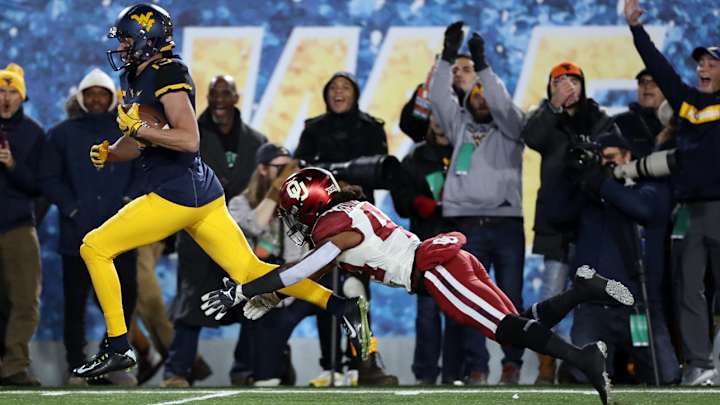Alex Grinch Gives Oklahoma's Defense a New Outlook and No Excuses After 2018's Embarrassment

NORMAN, Okla. — Oklahoma’s last four national championship teams have featured stat-stuffing offenses and nearly impenetrable defenses. The Barry Switzer–led squads that won back-to-back titles in 1974 and ’75 and a third in 1985 punished opponents with the Wishbone offense, a devastating option-based attack that took whatever it wanted on the ground. While less schematically iconic, the defenses on those teams, led by the Selmon brothers (Lucious, Dewey and Lee Roy) in the mid-’70s and by All-America linebacker Brian Bosworth in ’85, were units to be feared. Bob Stoops’s lone national title came from a team that scored 37 points per game and allowed just 14.9 during the 2000 season, shutting down Florida State in a 13–2 BCS championship game win. The names and accomplishments may have changed over the years, but the balanced dominance was a constant.
In the two decades since the school's last title, Oklahoma has had roughly a half-dozen more championship-worthy teams come up short, often done in by shortcomings on the defensive side of the ball. Last season, Oklahoma fielded one of the worst defenses in the Power 5, but thanks to a historically explosive offense led by Heisman Trophy winner Kyler Murray, the Sooners managed to win a fourth-straight Big 12 title and return to the College Football Playoff for the third time in four years.
The successes of Lincoln Riley's first two years as head coach since taking over for Stoops are commemorated in his expansive office inside the Barry Switzer Center, which displays the team and individual awards that have highlighted the most recent playoff runs. Riley has become one of the hottest names in college football on the strength of his reputation as an offensive architect, with NFL coaches picking his brain and blue-chip recruits around the country signing on to join the deep roster of skill players in Norman. In order to add a College Football Playoff trophy to that case, Riley knows the defense has to catch up.
“We haven’t played up to our capability, certainly, consistently,” Riley says. “We’ve had some outstanding individual games. You don’t win four [Big 12 titles] in a row and get to the playoffs three out of four years without some really good play defensively. We've had that at times, but it has certainly not been near as consistent as we feel like we can be.”
Riley insists he didn’t lose any sleep over his team’s defensive woes, but in October he fired longtime defensive coordinator Mike Stoops after the Sooners allowed 501 yards in a 48–45 loss to Texas. Interim coordinator Ruffin McNeill could not turn the unit around. In the College Football Playoff semifinal at the Orange Bowl against Alabama, the Sooners found themselves down 28–0 less than 20 minutes into the game, losing 45–34 after the offense roared to life but could not fully compensate for a defense that gave up 528 yards. Riley acknowledges that a repeat of last year’s seasonlong defensive effort would not be acceptable, no matter how good the offense is.
“Our kids fought,” Riley says. “We were winning. We were holding up championship trophies and going to the playoff and doing all that. It’s on me, it’s on our recruiting. It’s on everybody. But with that being said, we’re not far off especially with the way we recruited in the last few years, from having the talent to have a top-level defense, and I got to make sure every other part of the program is in line to do that as well.”
A few days after the season ended in South Florida, Riley went to work on what he labeled as the offseason’s top priority. Enter 38-year-old Alex Grinch, who led Washington State’s defense to respectability despite the strain put on it by the Air Raid offense Mike Leach runs (which is also the offense that Riley runs). Grinch was on Ohio State’s staff in 2018 behind Greg Schiano and jumped at the chance to run Riley's defense.
“I was really looking for just the right match,” Riley says. “As I got a chance to speak with him it was pretty apparent, pretty quickly. Once I made the decision to do it and then you know after the playoff game and get a chance to dive fully into it, it didn’t take me long.”
The nephew of former Missouri coach Gary Pinkel, Grinch won three national championships as a player at Division III powerhouse Mount Union, then served as a graduate assistant at Missouri in 2003 and ’04 before jumping to New Hampshire, Wyoming and eventually back to Missouri for three seasons from ’12 to ’14.
Just as he did when he arrived at Washington State for his first DC gig, Grinch has taken over a unit in disarray, eager to show doubters that teams whose offenses are built off Air Raid principles don't have to field defenses that are fine with giving up 40 points a game. Grinch’s defenses play fast, with an emphasis on making life hard for the quarterback and creating turnovers.
“Our performance matters, and the standard at Oklahoma is to have one of the top defenses in the country to match one of the top offenses in the country,” Grinch says. “Why? Because it’s Oklahoma. No one said we had to come here, myself included.”
Coaching defense can be a unique challenge in the Big 12, where last season seven out of 10 teams averaged more than 25 points a game and Air Raid variants thrive. Grinch’s scheme strives to fulfill four basic characteristics: sound, simple, repeatable and adaptable.
“It's hard to play in the Big 12 defensively. Yeah, so? That talk had to stop,” Grinch said.
Grinch’s approach to defensive excellence is much like the approach of a movie director who makes actors perform repeated takes until they get the shot right. Candy bars are handed out as rewards for those who excel in practice, while punishments await loafers.
“Knowing that, you know if that’s not for them, then there’s other places that the standards are a little bit lower. The number-one thing was just the no-excuses type of concept that we continue to hammer home,” Grinch says.
The Sooners will return as many as 10 defensive starters, but with spring injuries to senior linebacker Caleb Kelly and defensive end lineman Jordan Kelley that appear to have put their availability in question this fall, Grinch may have some built-in excuses all the same. With excellent offenses waiting on the schedule, starting with Houston in Week 1, improvement could be slow in arriving.
Defensive tackle Neville Gallimore believes the tearing down of the defense had to be done if the Sooners want to win a fifth straight conference championship.
“Like Coach Riley says, we have to be accountable for the things we do around here,” Gallimore says. “It starts and ends with the players.”
Last year Oklahoma finished 114th in the FBS in total defense and dead last in pass defense, gave up 74 plays of 20 or more yards, allowed more than six yards per play and forced only 11 turnovers. The offense had five games in which it gained at least 300 yards both passing and rushing; meanwhile, the defense allowed over 500 yards in five different games.
“Just not our standard,” Riley says, shaking his head in obvious disgust when recited those stats. “Any part of it. And so now we realize that the challenges of playing the schedule we do, playing the quality of offenses that we do and then our defense having to play opposite of our offense and people knowing that if they don’t score 40, we don’t care who you are, chances are pretty low that you’re going to win.”
So what is going to be different this time around?
“Effort,” says senior linebacker Kenneth Murray, who led team in tackles in 2018 and recorded 28 stops in September’s overtime win against Army. “That means getting to the ball, and playing with better technique.”
Stepping into a difficult situation is nothing new for Grinch, who still looks like he could don shoulder pads and mix it up in live drills. As he looks at a sheet on his desk detailing practice performances, Grinch repeats the phrase, “If you defend it once, you can defend it twice,” to drive home the point of his philosophy.
“It’s a results business,” Grinch said. “That’s what we sign up for as coaches, and the reminder to the players is that’s what they signed up for as well.”
